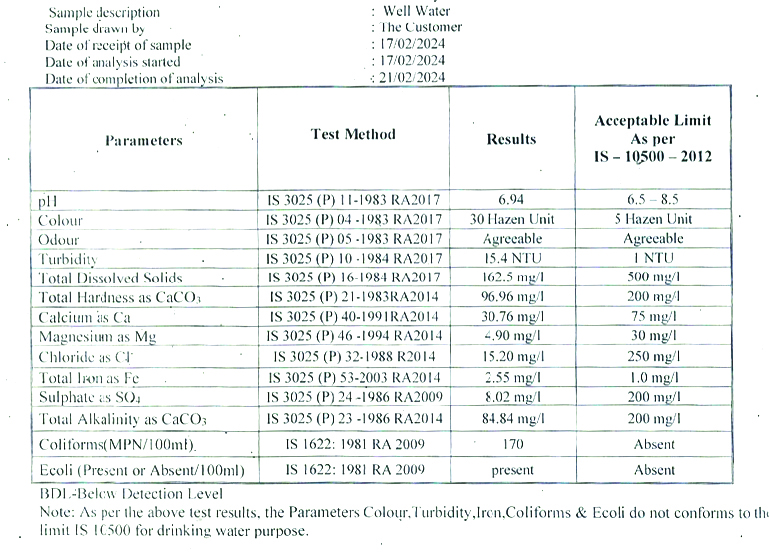Introduction
Water is a fundamental resource for life, essential for drinking, general purposes, agriculture, industry, and environmental sustainability. However, the quality of water can vary significantly depending on its source and surrounding environment. To ensure that water is safe for various purposes, thorough analysis and testing are essential. In this blog, we delve into understanding water analysis reports and their components, and interpreting the findings to safeguard health and well-being.
Overview
A water analysis report is a comprehensive document that provides detailed insights into the quality of water sampled from a specific source. It encompasses various parameters such as pH level, color, odor, turbidity, total dissolved solids, hardness, iron content, microbial contamination, and other chemical constituents. These parameters play crucial roles in determining the suitability of water for general purposes, consumption, agricultural use, industrial processes, and environmental protection.
Water analysis reports serve as critical tools for ensuring compliance with safety standards set by regulatory agencies and organizations. They are often conducted by accredited laboratories like Kerala Water Authority Laboratories, equipped with specialized equipment and expertise in water testing. The results obtained from these analyses help identify potential issues with water quality and inform decisions regarding treatment or management practices to maintain or improve water quality standards.
Key Parameters in Water Analysis Reports
In India, water analysis reports typically include a set of parameters specified by the IS-10500-2012 standard, ensuring conformity with established safety guidelines. Some of the most common parameters overseen in these reports include:
- Color: Monitoring color levels in water, with acceptable limits set at 5 Hazen Units, is crucial for ensuring water quality, aesthetics, and consumer satisfaction by indicating cleanliness and absence of contaminants.
- Odor: Monitoring odor levels in water, with acceptable limits defined as “agreeable,” is crucial for determining water quality and consumer satisfaction by ensuring cleanliness and usability for various purposes, free from unpleasant smells.
- Turbidity: Turbidity measures the clarity of water, with a limit of 1 NTU (Nephelometric Turbidity Unit) ensuring transparency.
- Total Dissolved Solids (TDS): TDS represent the concentration of dissolved minerals and salts in water, with a permissible limit of 500mg/l.
- Total Hardness as CaCO3: Total Hardness measures the concentration of calcium carbonate and other mineral ions in water, with acceptable limits set at 200mg/l to prevent scaling and minimize potential adverse effects on plumbing systems.
- Calcium as Ca: Calcium levels in water, with acceptable limits set at 75mg/l, are crucial for assessing water quality and preventing issues such as scaling and corrosion in plumbing systems, ensuring the longevity of infrastructure and maintaining water purity.
- Magnesium as Mg: Magnesium levels in water, with acceptable limits set at 30mg/l, play a vital role in determining water quality and preventing potential issues such as scaling and corrosion in plumbing systems, contributing to the overall integrity and safety of water infrastructure.
- Chloride as Cl: Elevated chloride levels in water can lead to a salty taste and contribute to corrosion in plumbing systems; the maximum permitted limit is 250mg/l.
- Total Iron as Fe: Excessive iron in water can cause a metallic taste and staining, leading to clogs and reduced efficiency in pipes and appliances; the maximum permitted limit is 1.0mg/l.
- Sulfate as SO4: High sulfate concentrations in water can impart a bitter taste and react with metals, leading to corrosion and the release of toxic substances; the maximum permitted limit is 200mg/l.
- Total Alkalinity as CaCO3: Alkalinity levels influence water’s buffering capacity against pH changes, crucial for stability in treatment processes.
- pH level: Maintaining a pH range of 6.5-8.5 is crucial for water quality, as deviations can indicate acidity or alkalinity that may affect taste and chemical reactions.
- Coliform: Coliform bacteria presence in water indicates potential bacterial contamination, with acceptable limits set at its absence, ensuring water safety and minimizing health risks associated with microbial contamination.
- E. coli: E. coli presence in water signals fecal contamination, with acceptable limits set at its absence to ensure water safety and protect against the risks of waterborne illnesses. Monitoring E. coli levels is crucial for maintaining water quality standards and safeguarding public health.
Sample Water Analysis Report

Expert Guidance and Solutions
Contact True Nectar with your Water Analysis Report to get expert guidance on your water quality requirements and to install the best water treatment plant or water filter for your home, commercial purposes, and industrial purposes in Kerala, India. True Nectar specializes in providing tailored solutions to address specific water quality challenges, ensuring access to safe and clean water for all your needs. Whether you’re seeking residential filtration systems, commercial water treatment solutions, or industrial-grade purification systems, True Nectar offers a wide range of products and services to meet your requirements. With a team of experienced professionals and a commitment to excellence, True Nectar is your trusted partner in ensuring water quality and safety.
Conclusion
Water analysis reports are indispensable tools for assessing water quality and ensuring compliance with safety standards. By analyzing various parameters such as pH, color, odor, turbidity, and chemical constituents, these reports provide valuable insights into potential issues and guide decisions regarding treatment or management practices. Understanding and interpreting the findings of water analysis reports are essential steps in safeguarding public health, protecting the environment, and promoting sustainable water management practices. Contact True Nectar today to take proactive steps towards ensuring safe and clean water for yourself, your family, and your community.
Also learn the Importance of Water Analysis Report.
Contact Us:
For inquiries and consultation, contact True Nectar at:
Phone: +91-8606207917 | +91-9044882233
Website: www.truenectar.in
Follow Us: Connect with us on Facebook for updates and reviews: True Nectar Facebook Page
Find Us on Google: Explore more about us on Google Maps: True Nectar on Google Maps
